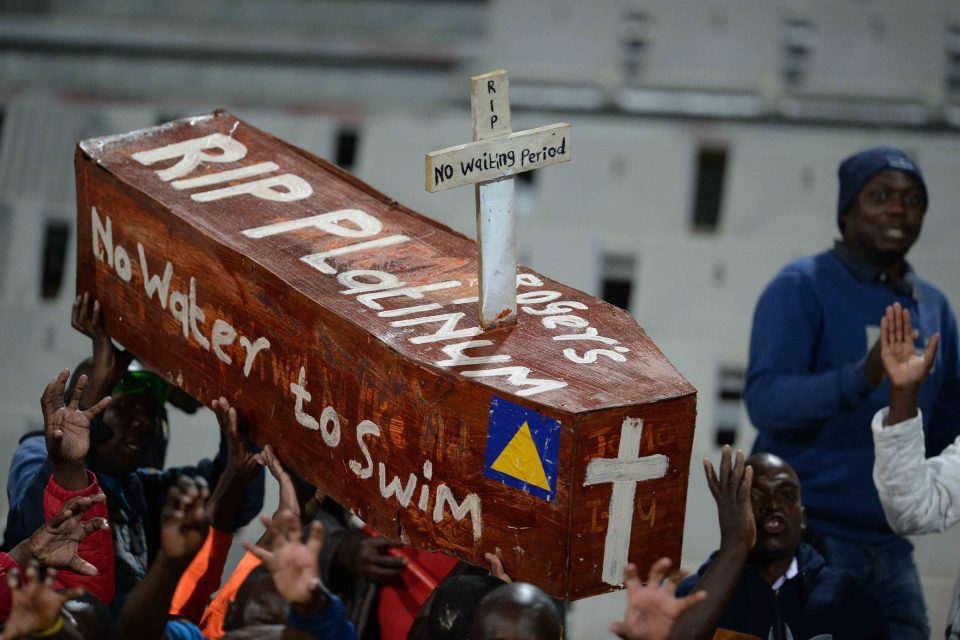Platinum Stars, a dream deferred
What was a dream coup for the people of North West, finally having a team in the elite league, turned into a nightmare when the club was reduced to a ‘tribal team’.
Author:
5 October 2019

The writing was always on the wall for Dinaledi (Stars) – the first nickname of the now defunct Platinum Stars – which was sold for peanuts to give birth to Cape Umoya United. Last year the Royal Bafokeng announced the sale of the club to Rawat Petroleum, a Johannesburg-based consortium, for a paltry R22.5 million – 50% less than Bafokeng paid when they acquired the club’s majority shares in 2007.
The plummeting price of platinum left the owners with no choice but to sell, ironic given that when the Royal Bafokeng purchased 51% of Polokwane-based Silver Stars one of its aims was to plan for life without the metal. But the club had long ceased to be the dream it was sold as. Its sale just made it official for some people in the North West that they didn’t have a team in the elite league of South African football anymore. The real losers were the communities whose youngsters had looked to the club’s development for salvation.
Dinaledi arrived in Phokeng imbued with dreams of dominance and glory in a province that didn’t have a team in the Premier Division. To assist in their quest to win over supporters, public relations guru Putco Mafani was brought in. But it was the youngsters across the province who had scored big in the team’s migration.
They had long watched their peers in other provinces with professional teams climb up the ranks. Now they had a stepping stone to professional football with the club’s development structures that recruited youngsters from around the province and Bafokeng communities.
“Through the club, we have managed to create development and employment opportunities for youngsters and other members of the Royal Bafokeng Nation,” the club said in the statement that announced its sale.
But behind the more obvious reasons of development and pride, there was a reason everyone knew but seldom expressed: envy. The purchase of the club was also an attempt to quench a hunger for recognition, and forge a new social identity. Though temporary, provinces like the Free State were proving successful in using sport to carve some sort of an identity, thanks to the passion of Bloemfontein Celtics supporters.
Stars’ downfall
The new owners initially sought to give a province, which for years was considered a sporting orphan, something to rally behind. But in the decade Platinum Stars called North West home, the team failed to transform itself into a provincial team, which was one of its initial ambitions.
Bafokeng stressed economics as the main reason behind the sale of the club. It’s common knowledge among fans and journalists that the plummeting price of platinum and the instability in the club’s management contributed greatly to its undesirability. Beyond that, the regular changes to the technical team began to have a sustained effect on Platinum Stars, which ultimately led to relegation.
But ordinary people on the streets of North West hold a different opinion. Ask and they’ll tell you part of what collapsed Dinaledi was tacitly “tribal”. What began as a mass project to thrust the province onto the national sporting stage slowly began to resemble a Bafokeng-only community project. Though fans had long watched as Platinum Stars slowly retired its provincial ambitions and became reduced to something of an informal Phokeng community team, it was the rebranding in 2013 of Dinaledi to Dikwena (Crocodiles), a totem of the Bafokeng Nation, that drove the point home.
Related article:
The club’s general manager at the time, Jason Raine, was more blunt with what they sought to do. “It is vital to us that the Bafokeng people identify with Platinum Stars and by re-branding ourselves with the colours and the emblems of the Royal Bafokeng Nation [we can achieve that],” Raine said.
Kgosana Joseph Rapetsana, who was one of the people involved in the sale of the club, refuted claims that the club had “tribalistic elements”.
“It’s unfortunate that people think it’s tribal or something like that. We have, for several years, attempted to make a home for the team beyond [Bafokeng]. We asked for some of our home matches to be played in Potchefstroom and Mahikeng. There was always resistance, local authorities weren’t as keen and we were sent from pillar to post. The infrastructure itself is not that good. We settled in Moruleng Stadium which wasn’t completely satisfactory,” Rapetsana said.
The end of an era
Dikwena’s initial desire to win hearts is reflected in a 2009 public campaign to find the club’s new nickname on Radio Mafisa and North West FM. Listeners across the province were asked to contribute to the club’s new identity. Dinaledi was a fan favourite. But a decade since they envisioned the stars, the skies have darkened. Though it will maintain much of the sporting facilities that attracted the stars to the North West, for youngsters in Phokeng and around the province it is back to watching their peers in other provinces shine.
“It saddens me, but that is the reality of our business. The price of platinum has reduced our ability. We are solely responsible for much of the infrastructure in Phokeng,” Rapetsana said, when asked about the youngsters who’ve lost out as a result of the club’s sale.
He pauses in the middle of our phone call to take breath, it’s as if I’ve just reminded him of something he was beginning to make peace with. “Because not every child is academically talented, our other plan was that the team could serve as an alternative. Those who weren’t doing so well in the classroom could maybe excel on the field,” he says.
Related article:
The collapse of Platinum Stars is ultimately a class issue. Mining communities in the platinum belt often cry about lack of consultation when decisions affecting whole communities are made and the decision to sell Platinum Stars, a community assert, was no different. After the announcement that the club was sold with immediate effect, a group of community members threatened to challenge the decision in court as the community was not properly consulted.
“There were several issues with the community’s attempt to rescue the club, for one PSL doesn’t just sell to anyone,” Rapetsane said. “You have to have the financial muscle to maintain the team and keep it on schedule. While we would’ve loved to sell the club to locals and keep it in Phokeng, many of the proposed suggestions simply weren’t satisfactory. I should also add that Platinum Stars is not the only entity we’ve had let go.”
The relationship between communities and mining companies and authorities that aid them, as we’ve seen in Xolobeni, are often characterised by exploitation, particularly when health and environmental issues are raised. And in North West’s platinum belt, as observed by academic Dr Joseph Mujere in his 2015 research paper, Platinum, Poverty and Protests: platinum mining and community protests around Rustenburg, “[it] is the lower classes especially the workers, villagers and residents of informal settlements that have emerged on the margins of the mines who bear the brunt of the worst effects of mining”.
Some would say the hurried sale of Platinum Stars is in some way a manifestation of that exploitation.


